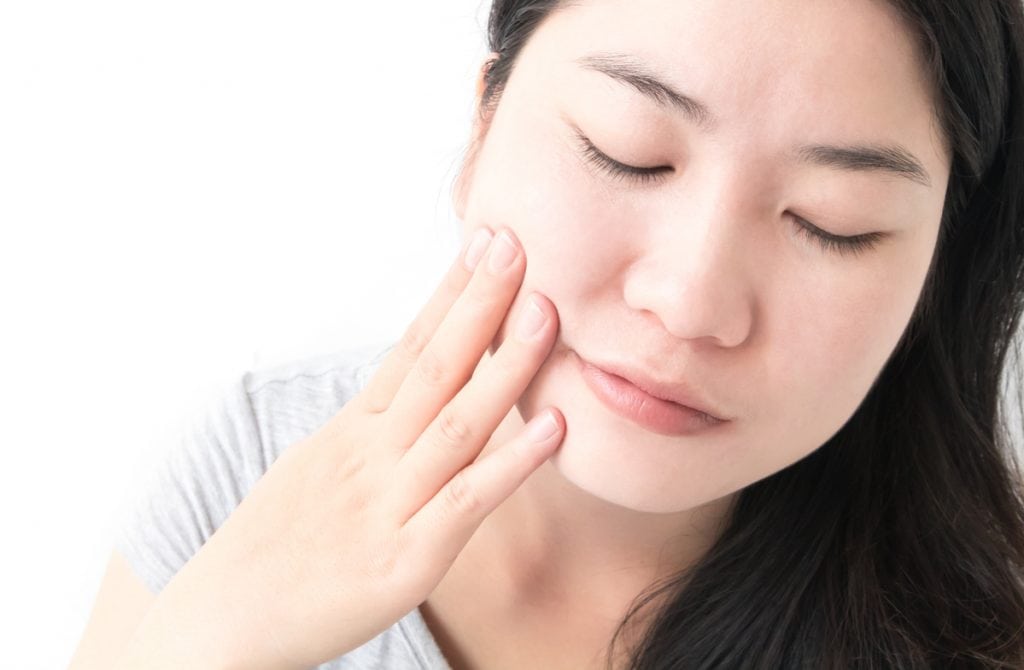Your temporomandibular joint is a hinge that connects your jaw to the temporal bones of your skull, which are in front of each ear. It lets you move your jaw up and down and side to side, so you can talk, chew, and yawn.
Temporomandibular Joint Disorders, or TMD for short, are disorders that cause pain in your jaw joint, and muscles.
What Causes TMD?
Surprisingly, TMD is more common than we think, and at least a third of adults aged 20 to 40 have been found to show symptoms of TMD. Studies also show that women are also more likely to have TMD than men.
While the cause of TMD often varies from each patient, they can stem from a variety of factors including jaw injuries, chronic teeth grinding and clenching, or underlying medical conditions like systemic arthritis. Stress can also be a cause or aggravator of TMD.
What are the Symptoms of TMD?
People with TMD may experience:
- a numbing pain in their jaw area or temporomandibular joints (TMJs),
- discomfort in the muscles controlling their jaws
- difficulty opening or closing one’s mouth.
Let’s take a look at the different types of TMDs that one may develop.
The 3 Types of TMD
TMD is often classified into 3 main categories:
- Myofascial pain
- Internal derangement of the joint
- Arthritis
The most common disorder of the 3 — myofascial pain, involves soreness and pain in the muscles that control your jaws. Symptoms can include tension and fatigue in the muscles and jaw area.
Internal derangement of the joint involves a displaced disc or dislocated jaw. This can happen if one is a frequent teeth grinder or clencher, or has taken a large impact on their jaw area. Symptoms of this disorder include a clicking jaw and/or a locked jaw.
Arthritis is a group of degenerative/inflammatory joint disorders that can result in TMD.
Osteoarthritis, a type of arthritis, occurs when the cartilage of your joints wears away. This causes the bones of your jaw to rub against one another, resulting in severe pain. While it’s a condition that often occurs with aging, it can also affect young adults. It is also often associated with the overuse of TMJs. Symptoms include soreness in the jaw area and a locked jaw.
How Serious is TMD and Should I be Concerned?
Now, the real question. When does it become a cause for concern?
While TMD can become a serious problem that requires measures like surgery, the disorder can probably be eased with some simple home remedies if your symptoms don’t hurt. This includes clicking sounds that your jaw might make when opening or closing your mouth. However, you should be concerned if you feel pain or experience stiffness in your jaw area.
In short, if it hurts, it might a problem.
Home Remedies for TMD
There are a few things you can do on your own to help relieve TMD symptoms:
You can exercise your jaw muscles. By gently stretching and relaxing your jaws with your fingers, it can help relieve stiffness. These temporomandibular joint exercises are said to strengthen jaw muscles, increase jaw mobility, and promote jaw healing.
Use a moist heat compress and/or cold compress. By placing the heat compress against your face, your jaw muscles will relax. You may also choose to rotate between hot and cold compresses for better relief.
Consume food in bite sizes. Cutting up that piece of broccoli or potato into smaller pieces will limit the stress exerted on your jaw muscles. This will reduce the discomfort caused by your TMD.
Seek Professional Dental Treatment for TMD
Home remedies not working? Don’t pull your hair out just yet. Dentists can provide professional advice and treatment to your TMD condition.
Prescribed Medications. Your dentist might suggest a muscle relaxer to relax your jaw if you grind or clench your teeth. Anti-anxiety medication and antidepressants may also be prescribed to relieve the pain brought on by TMD or stress. Dentists can prescribe higher doses of NSAIDs if you need them for pain and swelling.
Use oral splint or night guard. These plastic mouthpieces lessen the effects of clenching or grinding and correct your bite by putting your teeth in a more correct position. You will need a nightguard if you only clench or grind your teeth at night. If your clenching or grinding happens in the day or at both times, your dentist might recommend a splint instead.
Dental treatment to fix your teeth. Your dentist may suggest getting crowns, bridges, or braces to balance the biting surfaces of your teeth or correct a bite problem that causes your jaw pain.
Oral Surgery. If you have a severe case of TMD, your dentist might suggest getting a surgical procedure done to ease your TMD. This may include the repositioning of the TMJ condyle or a full-mouth reconstruction.
Fixing the Root of Your TMD Condition
Your teeth-grinding or clenching may stem from a more serious issue like Sleep Disordered Breathing. This includes disorders like Sleep Apnea or Upper Airway Resistance Syndrome (UARS), which will require a deeper analysis to determine the severity of your clenching or grinding habit.
If you experience severe pain from the symptoms of TMD, you are highly advised to consult a dentist or specialist to assess your problem.
At T32 Dental Group, we have specialists that can assess your TMD problem and provide you with an array of dental solutions to fit your needs!
If you have any questions, feel free to send an online enquiry or call us at one of our branches. We will get back to you as soon as possible.
